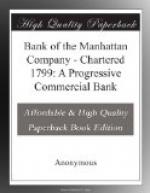Title: Bank of the Manhattan Company Chartered 1799: A Progressive Commercial Bank
Author: Anonymous
Release Date: December 22, 2005 [EBook #17374]
Language: English
Character set encoding: ASCII
*** Start of this project gutenberg EBOOK bank of the Manhattan company ***
Produced by Curtis Weyant, Sankar Viswanathan, and
the
Online Distributed Proofreading Team at http://www.pgdp.net
(This file was produced from images generously made
available by Cornell University Digital Collections)
Bank
of the
Manhattan
Company
Origin
history
Progress
40 Wall
Street
New York
[Illustration: Present
office of the Manhattan company
40-42 Wall Street
Building erected jointly in 1884 by the Manhattan
Company and the
Merchants’ National Bank]
Bank
of the
Manhattan company
Chartered1799
A progressive commercial bank
[Illustration: Chief of the MANHATTANS]
40 Wall
Street
new York
[Illustration: Common Seal]
On May 8th, 1799, the Committee of By-Laws reported “that they had devised a common seal for the Corporation, the description of which is as follows:
“Oceanus, one of the sea Gods, sitting in a reclining posture on a rising ground pouring water from an urn which forms a river and terminates in a lake. On the exergue will be inscribed ’Seal of the Manhattan Company.’”
There are nine banks now in existence whose history reaches back into the Eighteenth Century. Of these, two are in Massachusetts, two in Connecticut, one in Pennsylvania, one in Delaware, one in Maryland and two in New York.
Corporate banking in New York began with the organization of the Bank of New York by Alexander Hamilton in 1784, which received its charter in 1792. For fifteen years this bank, together with the New York branch of the first Bank of the United States, were the only banks doing business in either the City or State of New York. With Hamilton and the Federals in control of the Legislature, new bank charters were unobtainable. This monopoly of banking facilities in the City and State was of great strategic value to the political party in control, and naturally aroused jealousy and resentment among the members of the opposition, whose leader was Aaron Burr.
[Illustration: Excerpt from charter]




